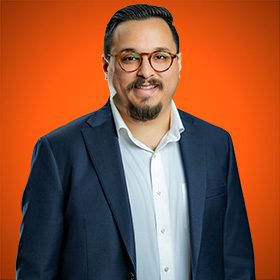Ezequiel Dominguez is a PhD student in social work at Arizona State University. He is a member of Health Policy Research Scholars Cohort 2023.
Tell us a little bit about yourself! What’s the story behind your research interests and why you’re doing the work you’re doing?
My research focuses on the broad issue of human trafficking, with a particular emphasis on labor trafficking or forced labor within the greater Latino community, to which I belong. This passion stems from my personal connection, as members of my own family were field workers. Additionally, my grandparents who raised me were actively involved in the United Farm Workers movement alongside influential figures like Cesar Chavez. During my teenage years, I found immense inspiration in these collective efforts aimed at addressing social injustice. It is my family’s history and their initial involvement in this work that continues to fuel my passion for combating human trafficking, particularly in the context of labor exploitation among the Latino laborer community.
For people who may be unfamiliar with your research area, what’s a piece of information that’s important for them to understand?
The study of labor trafficking is a relatively recent area of research. While it is commonly stated that anyone can be a victim, ongoing research reveals that certain communities are disproportionately vulnerable due to historical social injustices. In the current climate of harmful narratives surrounding immigrants and non-native individuals in the United States, it is crucial to challenge these assumptions and emphasize the importance of providing resources and support to every individual, regardless of their background. Every person deserves access to essential resources and support that are fundamental to their community’s health and well-being.
How do you envision your research contributing towards a Culture of Health? What specific areas or communities are you most passionate about in this regard?
The Latino laborer community, particularly day laborers and field workers, has long been marginalized and excluded from important discussions. As an aspiring community-based participatory researcher, my goal is to help bridge this gap and amplify their voices. I firmly advocate for making community perspectives central in our efforts to foster a Culture of Health.
Beyond your current research, do you have any long-term goals within your field that you’d like to pursue?
I’m finding myself increasingly drawn to academia. I’ve recently begun teaching and have come to appreciate the privilege of guiding the next generation of social workers. My aim is to maintain a strong focus on students, providing them with the knowledge and skills I’ve acquired through my experiences with HPRS. By doing so, I hope to initiate a cycle of professionals who are empowered to challenge the systems that impede progress toward a Culture of Health.
How do you see HPRS complementing your doctoral training?
HPRS opens doors that many doctoral students might not have access to. This includes the chance to network with fellow scholars, especially from different fields, as well as the opportunity to explore innovative approaches for conducting impactful research.
What about HPRS excites you the most? What are you looking forward to as a scholar?
I’m really grateful for connecting with people who understand the same struggles and achievements. Being in a doctoral program can feel very isolating, but HPRS has brought us together. I’m excited about supporting each other, growing together, and achieving incredible things both during and after HPRS.
What advice would you offer to aspiring researchers looking to embark on a similar path to yours?
Absolutely, go for it! Imposter syndrome is a common struggle, especially for those of us from marginalized or underserved communities. It often leads us to doubt our presence in certain spaces, even when we’ve put in tremendous effort to get there. But it’s a lie! We are capable, we have the right to learn, and we absolutely belong here.
Let’s wrap up with a fun question: If you had a time machine, what era in history or in the future would you choose and why?
If I had a time machine, I’d love to go back just a few decades to the time when there was a lot of community organizing, especially around the United Farm Workers movement. I think there’s still so much we can learn from those grassroots efforts led by the Latino community!

